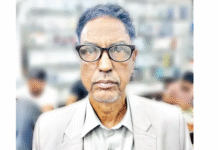They were our compatriots with whom we shared our laughter, our moments of sadness. We watched dawn break in their company. And with them we saw the sun set at the end of day. And then came the day when the sun set on their lives.
This morning, we remember the men and women done to death by the murder squads of the collaborators of the Pakistan occupation army. Forty one years after December 1971, the pain of remembering is as agonising as it was the moment when we first discovered that they had been a bducted, that indeed they had been subjected to a gory end by the forces of darkness, traitors to the cause unwilling to have their masters from the west lose the war. Faced with the prospect of losing the war, these denizens of medieval darkness were not willing to have the new nation of Bangladesh arise purposefully out of the ashes of what had been a nightmare, a tragic phase of history.
These dead were some of the best of our citizens. They were, in that brilliantly glorious sense, among the brightest of individuals in this land of a continuity of dreams. That they were killed with a purpose, that of undermining a nation at the threshold of freedom, was a truth not lost on observers of the history that was in the process of being made through the nine months of an intense and intensifying war of liberation from March to December 1971. They were picked up by the al Badr and al Shams, goon squads of the Jamaat-e-Islami working in sinister union with the Pakistan occupation army. And then came the picking off, in slow, tortuous degrees.
If for Bangladesh the murder of these individuals was tragedy unparalleled in history, for Pakistan it was to be a shame that time would not wash away. And for the handful of Bangalees who collaborated with the occupation forces, it was a scandal they would never be able to live down or turn away from. For these quislings, history would prove to be a hard taskmaster.
The tragic truth, though, is that history has been laggard in ensuring justice for the victims of genocide we remember in a bleak December every year. For a nation which resolutely marched into a struggle for liberty and eventually brought the enemy to his knees, the expectation of a system of justice based on globally accepted standards where it came to a taking of the perpetrators of war crimes and crimes against humanity to account was swiftly belied. Bangladesh’s particular tragedy, unique in its features and rare in the annals of history, consisted in its inability not only to bring the men behind the murder of its leading intellectuals to account but also in being compelled to observe the forces of anti-history, or reactionaries thriving under military rule, rehabilitate these killers of patriotic men and women in a country they did not believe in.
Our shame was and will endure: those who went out on a limb back in 1971 to prevent our rise to statehood, who cheerfully assisted the Pakistan occupation army in doing away with the lives of three million Bangalees and in molesting two hundred thousand Bangalee women were to find, to our horror, berths for themselves as powerful politicians in a land left swiftly humiliated by anti-history.
But history does get back at treachery at certain intervals of time. Today we course through life with a very real prospect of those who escaped facing the wheels of justice actually confront their dark past. As we recall once again, with due solemnity, with that old, never-ending cracking of the heart, the gloom which descended on us when we discovered, even as we sang of the joy which comes of liberation, the sad, silent remains of our martyred intellectuals, we wait in the hope that the course of justice will finally come full circle, that the International Crimes Tribunals, through plugging all the loopholes and answering every question to the satisfaction of people at home and abroad, will in the end persuade us into believing — and seeing — that justice has been done.
For two score and one years, the widows and children of the martyrs of December 1971 have gone from door to door, from government to government, asking that the souls of their loved ones be permitted to rest through their murderers being made to account for their ancient criminality.
This morning, forty one years after those compatriots of ours were abducted, and killed in medieval manner by primitive-era barbarians inhabiting modern times, it is time to reassert the old promise: that the sacrifices of these intellectuals shall not have gone in vain, that as a nation we will rebuild life in the knowledge that they died in order for the future to come to our doorsteps.
Source: The Daily Star










